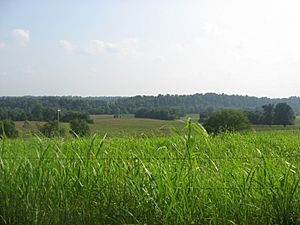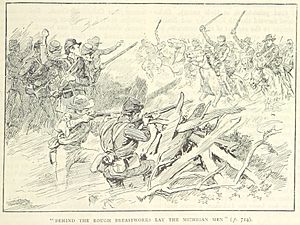Battle of Tebbs Bend facts for kids
Quick facts for kids Battle of Tebbs Bend |
|||||||
|---|---|---|---|---|---|---|---|
| Part of the American Civil War | |||||||
 Overview of the battlefield |
|||||||
|
|||||||
| Belligerents | |||||||
| Commanders and leaders | |||||||
| John Hunt Morgan | Orlando H. Moore | ||||||
| Strength | |||||||
| 800-1000 cavalry 4 Artillery pieces |
5 companies of the 25th Michigan Infantry (approx. 200 men) | ||||||
| Casualties and losses | |||||||
| 35 killed 45 wounded |
6 killed 23 wounded |
||||||
|
Battle of Tebbs Bend
|
|||||||
| Lua error in Module:Location_map at line 420: attempt to index field 'wikibase' (a nil value). | |||||||
| Nearest city | Campbellsville, Kentucky | ||||||
| Area | 376 acres (152 ha) | ||||||
| Built | 1863 | ||||||
| NRHP reference No. | 99000900 | ||||||
| Added to NRHP | July 28, 1999 | ||||||
The Battle of Tebbs Bend was a fight during the American Civil War. It happened on July 4, 1863, near the Green River in Taylor County, Kentucky. This battle was part of a larger plan called Morgan's Raid. Even though they were greatly outnumbered, soldiers from the Union Army stopped many attacks by Confederate cavalry.
Contents
The Battle Begins
Confederate Brigadier General John Hunt Morgan led about 2,460 cavalrymen. Cavalrymen are soldiers who fight on horseback. He left Sparta, Tennessee, in June 1863. His goal was to distract the Union Army in the area.
Morgan moved north into Kentucky. On July 2, he crossed the Cumberland River. He then headed towards the Green River at a place called Tebbs Bend.
Union Defenses
The Green River crossing was guarded by about 200 Union soldiers. These soldiers were from the 25th Michigan Infantry. Their leader was Colonel Orlando Hurley Moore. Colonel Moore had prepared for a fight. His men built strong defenses in the woods. These included earthworks, which are walls made of dirt. They also used felled trees, called an abatis, to block the enemy. There were also rifle pits for soldiers to hide in.
Colonel Moore's main job was to protect an important supply road. This road was the easiest way for Morgan to reach Louisville.
First Shots
On July 4, at sunrise, Union guards saw the Confederate cavalry approaching. They immediately started firing. Soon, Morgan's cannons fired back. This wounded two Union soldiers.
Around 7 a.m., Morgan stopped the fighting. He sent three officers with a white flag, asking Colonel Moore to surrender. Morgan wanted to avoid more fighting. But Colonel Moore bravely refused to give up. The fighting then started again. Union sharpshooters, who are very good at shooting, quickly silenced Morgan's four cannons.
Fighting at the Bend
Morgan sent about 400 dismounted soldiers forward. Dismounted means they were fighting on foot, not on horses. These soldiers were led by Colonel Adam R. Johnson. They quickly took over the first rifle pits. But their attack stopped when they faced heavy fire from the Union soldiers. The Union troops were hidden behind the abatis (felled trees).
Morgan then sent in more soldiers to help. Over the next three hours, Morgan launched eight separate attacks. Each time, the Union soldiers pushed them back. Even a group trying to go around the Union defenses was stopped.
Finally, Morgan realized he could not capture the Union defenses. He sent another group with a white flag to Colonel Moore. He asked for permission to collect his wounded and bury his dead soldiers. After this was done, Morgan and his men left. They moved south along the Green River. They crossed the river at Johnson Ford. Then they headed back towards Campbellsville. The very next day, Morgan's men would fight again at the Battle of Lebanon.
Who Won and What Was Lost
The Battle of Tebbs Bend was a clear victory for the Union Army.
Casualties
The Confederate forces lost 35 soldiers killed and 45 wounded. A big loss for them was 24 experienced officers. These officers were often targeted by the Michigan sharpshooters. The Union Army had much fewer losses. They had 6 soldiers killed and 23 wounded.
Remembering the Battle
A monument for the Confederate soldiers was put up at the Tebbs Bend Battlefield in 1872. It says, "They have not been forgotten by their countrymen." In 1997, the battlefield was added to the National Register of Historic Places. This list recognizes important historical sites.
In 2013, about 200 people gathered to remember the battle's 150th anniversary. A new marker was dedicated to a Confederate soldier named Private Frank Voss. Some of his family members were there.
General Morgan asked for a truce to collect his injured and dead soldiers. These soldiers were buried in a mass grave. It is said that blood ran down into the road from the battle.
Today, only the Confederate cemetery remains at Tebbs Bend. The Union soldiers were first buried near the Green River. Later, their bodies were moved to the Lebanon National Cemetery in Lebanon, Kentucky.
Images for kids
 | Victor J. Glover |
 | Yvonne Cagle |
 | Jeanette Epps |
 | Bernard A. Harris Jr. |



